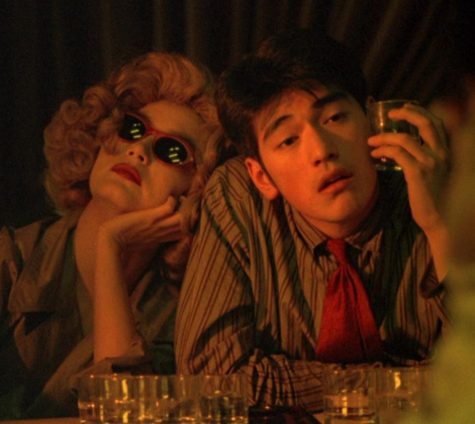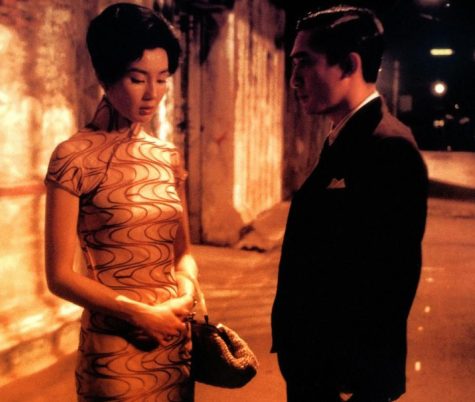Chungking Express and In the Mood for Love: Loneliness and Intersecting Stories
December 14, 2021
No filmmaker represents human emotion in the same way as Wong Kar-wai, and his films Chungking Express and In the Mood for Love both are strong examples of this. Chungking Express follows two policemen through their recovery from recently ended relationships, and In the Mood for Love follows the characters Mr. Chow and Mrs. Chan through their process of realizing and coping with the fact that their spouses are having an affair together. Through this process, they form a strong bond with each other. Both of these films share many commonalities, especially with the themes of love and loneliness, and they also represent two different periods in Wong Kar-wai’s career.
Chungking Express is split into two stories that each center around th e same restaurant. The first character introduced is He Zhiwu, also credited as Cop 223, in the aftermath of his girlfriend, May, breaking up with him. He continuously visits the restaurant in which May worked, hoping to reconcile with her; however, May quit her job at the restaurant. He decides that he will officially move on if she has not returned to him by May 1st, his birthday. At the restaurant, May is replaced by Faye, who is introduced to Cop 663, the second man dealing with a break up. Rather than obsessing about the dead relationship like He Zhiwu, he avoids it all together. Faye is instantly interested in him and his story, especially since she witnessed him before and after the relationship. When his ex arrives at the restaurant, she drops off a note for him and asks the owner to give it to him. He declines taking the note which contains the keys to his apartment, which leads to Faye using them to enter his apartment and redesigning to help keep him from focusing on what is gone. In the Mood for Love has a more tame plot, depicting the intersecting lives of two couples, the Chows and the Chans after they move into a new apartment building. Mr. Chow and Mrs. Chan, after realizing that their spouses are having an affair, seek one another’s comfort and support. These films both rely on the emotions of the characters, cinematography, and a non-linear and chaotic timeline to tell the stories, and also to create a film similar to how human memories work.
e same restaurant. The first character introduced is He Zhiwu, also credited as Cop 223, in the aftermath of his girlfriend, May, breaking up with him. He continuously visits the restaurant in which May worked, hoping to reconcile with her; however, May quit her job at the restaurant. He decides that he will officially move on if she has not returned to him by May 1st, his birthday. At the restaurant, May is replaced by Faye, who is introduced to Cop 663, the second man dealing with a break up. Rather than obsessing about the dead relationship like He Zhiwu, he avoids it all together. Faye is instantly interested in him and his story, especially since she witnessed him before and after the relationship. When his ex arrives at the restaurant, she drops off a note for him and asks the owner to give it to him. He declines taking the note which contains the keys to his apartment, which leads to Faye using them to enter his apartment and redesigning to help keep him from focusing on what is gone. In the Mood for Love has a more tame plot, depicting the intersecting lives of two couples, the Chows and the Chans after they move into a new apartment building. Mr. Chow and Mrs. Chan, after realizing that their spouses are having an affair, seek one another’s comfort and support. These films both rely on the emotions of the characters, cinematography, and a non-linear and chaotic timeline to tell the stories, and also to create a film similar to how human memories work.
Both of these movies focus on couples and relationships, but the events of the films, as well as the process of creating them are almost completely opposite. Chungking Express is a more simplistic yet chaotic film, especially due to the events behind the production. According to Amy Taubin, it was made “while Wong was taking a break from the lengthy, difficult post-production of…Ashes of Time (1994)” and “was intended as a money-generating quickie”, which resulted in the spontaneous plot. The film was done with production after three months too, which is fairly short compared to many of Wong’s films. It also starred many popular Chinese celebrities, including Tony Leung Chiu-wai and Canto-pop singer  Faye Wong. In the Mood for Love was also spontaneous in the filming, but it was also more planned than the former. Essayist Evan Puschak stated that there “was little more than an outline when Wong Kar-wai and his crew began filming [In the Mood for Love], a process that took a long 15 months.” For this reason and Wong’s method in filmmaking, the film jumps through time; in an interview, he described that part of the purpose for the movie was “to try to show the film in a repetitious way…[because he wanted] to show nothing changes, expect the emotions of these persons.” He was very conscious and worked meticulously on this film to create a realistic and harsh depiction of the struggles these characters faced. Perhaps the biggest contrast between these two films is the theme of hopelessness; Chungking Express shares this theme in some of the earlier moments of the two stories, but it eventually is solved and the characters move on. In the Mood for Love, however, takes the opposite path. Mr. Chow and Mrs. Chan doom their relationship from the start; eventually, their paths stop crossing, and they have many times where they almost meet again, but just barely miss one another.
Faye Wong. In the Mood for Love was also spontaneous in the filming, but it was also more planned than the former. Essayist Evan Puschak stated that there “was little more than an outline when Wong Kar-wai and his crew began filming [In the Mood for Love], a process that took a long 15 months.” For this reason and Wong’s method in filmmaking, the film jumps through time; in an interview, he described that part of the purpose for the movie was “to try to show the film in a repetitious way…[because he wanted] to show nothing changes, expect the emotions of these persons.” He was very conscious and worked meticulously on this film to create a realistic and harsh depiction of the struggles these characters faced. Perhaps the biggest contrast between these two films is the theme of hopelessness; Chungking Express shares this theme in some of the earlier moments of the two stories, but it eventually is solved and the characters move on. In the Mood for Love, however, takes the opposite path. Mr. Chow and Mrs. Chan doom their relationship from the start; eventually, their paths stop crossing, and they have many times where they almost meet again, but just barely miss one another.
Works Cited:
https://www.criterion.com/current/posts/766-chungking-express-electric-youth
https://www.criterion.com/current/posts/2494-in-the-mood-for-love-haunted-heart








